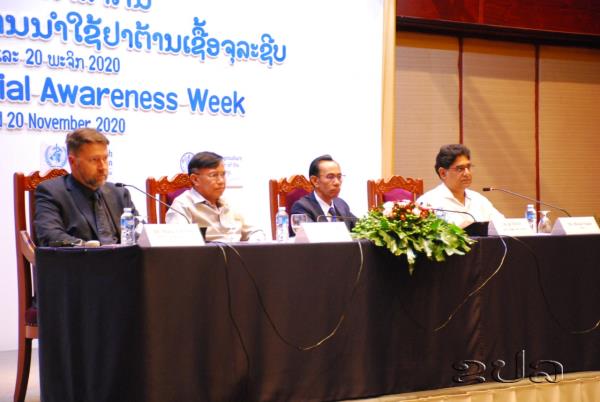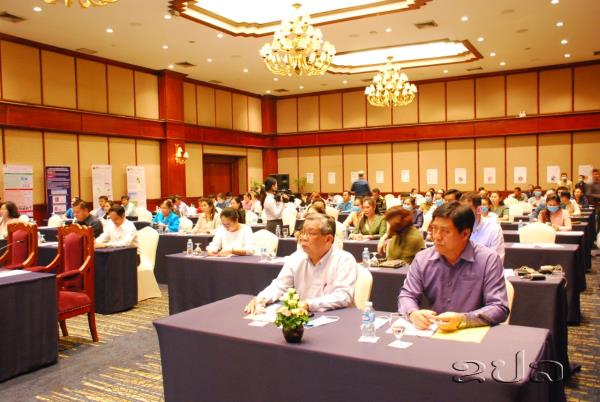KPL
(KPL) To mark World Antimicrobial Awareness Week 2020 (Nov 18-24), representatives of the Ministry of Health, the Ministry of Agriculture and Forestry, the Ministry of Natural Resources and Environment, the Food and Agriculture Organization of the United Nations (FAO), the World Health Organization (WHO) and other partners gathered today to raise awareness of the importance of all people to use antimicrobial medicines wisely.

(KPL) To mark World Antimicrobial Awareness Week 2020 (Nov 18-24), representatives of the Ministry of Health, the Ministry of Agriculture and Forestry, the Ministry of Natural Resources and Environment, the Food and Agriculture Organization of the United Nations (FAO), the World Health Organization (WHO) and other partners gathered today to raise awareness of the importance of all people to use antimicrobial medicines wisely.
Antimicrobial medicines, such as antibiotics, are crucial to fighting many serious diseases in humans, animals and plants.
However, using these drugs when they are not needed, or using the wrong drugs, or using poor quality drugs, or not taking the full course of the drug when it has been prescribed, have already led to antimicrobial resistance.
This is when bacteria, viruses, fungi and parasites change over time and no longer respond to the medicines designed to kill or stop their growth. This leads to treatment not working, higher costs, longer times for patients to recover, and even people dying from what should have been a treatable infection.

While opening today’s launch meeting of World Antimicrobial Awareness Week 2020, Dr. Rattanaxay Phetsouvanh, Director General of the Department of Communicable Diseases Control, Ministry of Health, said “It is essential to raise awareness of antimicrobial resistance and to encourage everyone to use antimicrobials wisely, whether they are the general public, health workers and policy makers. This will help to avoid the further emergence and spread of dangerous drug-resistant infections.”
In 2015, the government of the Lao PDR, together with countries around the world, adopted the Global Action Plan on Antimicrobial Resistance and made a commitment to tackle antimicrobial resistance in the country, and to contribute to regional and global containment efforts.

To guide the actions taken by the country, the Ministry of Health and the Ministry of Agriculture and Forestry, with the support of FAO and WHO, developed the National Strategic Plan on Antimicrobial Resistance in the Lao PDR for 2019-2023.
This strategic plan contains 5 objectives aligned with the aims of the Global Action Plan:
- Improve awareness and understanding of antimicrobial resistance – helping staff in both human healthcare and animal sectors, as well as the general public, understand more about the issue of antimicrobial resistance and the role they play in its containment.
- Strengthen the antimicrobial resistance surveillance system – in order to take appropriate action, it is important for health workers and policy makers to understand which types of resistance the main problems for the country are.
- Improve infection prevention and control – things we can do to reduce the risk of infection in the first place, so that antibiotics don’t need to be used as often.
- Optimize the use of antimicrobial agents in humans and animals – the more antibiotics we use, the more antimicrobial resistance will develop, so we must only use them when they are absolutely necessary and have been prescribed by a doctor or veterinarian.
- Improve coordination and budget support – making sure the relevant people and government departments are working on antimicrobial resistance and there is enough funding to make this happen.
During World Antimicrobial Awareness Week 2020, there are also some planned activities to raise awareness of the importance of antimicrobial resistance among all people, regardless of who they are, where they work or how often they get sick, and also awareness that everyone has a role to play in making sure we continue to have effective antimicrobials to treat infectious diseases today, and for many years to come. This is in keeping with the global theme of all people, everywhere, beingstewards for the future.
Besides the launch meeting today, there will be seven social media posts for seven days of the week through the Facebook page of the Ministry of Health’s Centre for Communication and Education for Health. Each day, the post will convey different key messages about antimicrobial resistance to Lao audiences online.
One problem that is still widely seen is when people treat themselves with antimicrobial medicine without getting advice from a health professional. This is even though it is illegal to sell or buy antimicrobials without prescription. Doing this is often a waste of money, it can easily help spread resistance, and it could be dangerous. This is one of a number of issues that will be discussed at two half-day workshops in Savannakhet province during World Antimicrobial Awareness Week – one for health professionals and another for private and agricultural sectors, mass media and mass organisations. The workshops aim to raise awareness of the role that each person, community and sector plays in using antimicrobials wisely, being a steward for the future by helping to tackle antimicrobial resistance.
WHO Representative to the Lao PDR Mark Jacobs said “Antimicrobial medicines are precious. Every day they save lives, here in the Lao PDR and around the world. It is up to all of us to make sure that they continue to work well and save lives, not only now, but for our future generations.”
KPL